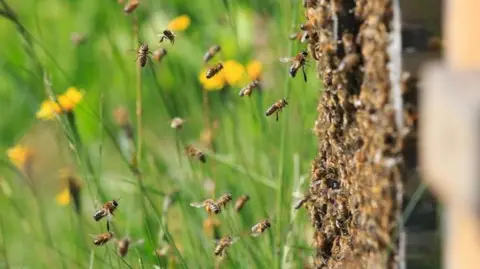Beehives removed after residents plagued by swarms
 BBC
BBCMore than 20 beehives have been removed from the back garden of a house in Worcester after residents complained they were being repeatedly stung and could not open windows or go outside.
Worcester City Council said a team had quickly investigated the matter and the hives had been removed, without any formal action being required.
Householders in Corfe Avenue, in the Warndon Villages area, told the BBC this week their lives had been made a "misery" by the swarming creatures, and tradespeople were staying away because of fears of being stung.
The problem was traced to a property with apartments rented to tenants. City councillor Sarah Murray said the owner had voluntarily removed the hives.
The BBC approached the owner but they did not respond.
Murray had earlier in the week claimed there were 21 hives in the back garden that were unmanaged, and she estimated they could contain up to one million bees.
On Friday, a Worcester City Council spokesman said: "After being alerted to the situation, Worcestershire Regulatory Services, acting on behalf of the City Council, quickly investigated the matter.
"This has resulted in the beehives being removed from the property, without any formal action being required."
A resident, who asked not to be named, said people had been informed 22 hives had been removed.
Residents had told the BBC the problem had developed over years, and one woman, who gave her name as Julie, said she had kept videos and a photo diary of the swarms "for the last couple of years".
Murray said families, pets and workers were being stung, residents were unable to open windows and home maintenance had been disrupted.
She also raised concerns over the environmental impact because honeybees in excessive numbers could outcompete bumblebees, solitary bees and butterflies.
After the hives were removed, she said she was pleased there had been a resolution without formal enforcement.
She called for future consideration of clearer local and national guidance around high-density urban beekeeping, particularly in residential areas.
 Getty Images
Getty ImagesFollow BBC Hereford & Worcester on BBC Sounds, Facebook, X and Instagram.
